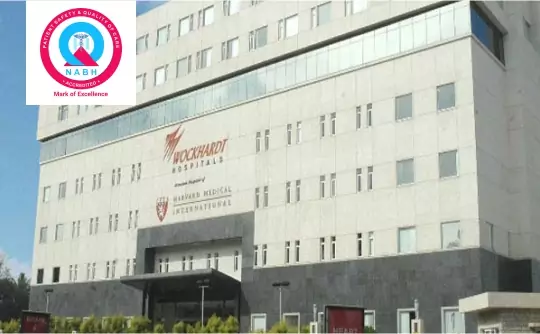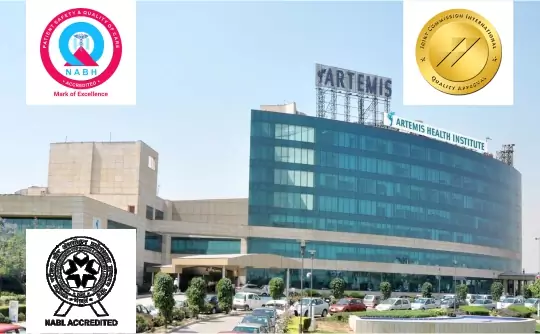

Shoulder Arthroscopy Cost in India starts from US $2,900 and varies depending on your medical condition and history, surgeon, hospital, and the city where you choose to get the surgery done.
An important expense when it comes to your shoulder arthroscopy surgery is going to be your orthopedic surgeon's fees. IndiCure recommends highly experienced, skilled, board-certified surgeons who are capable of delivering successful surgeries. Although the charges may vary depending on the experience of the surgeon, you are assured to be in safe hands with IndiCure.
A significant portion of the overall cost of a shoulder arthroscopy arises from the type of shoulder problem. This includes the nature of the problem i.e. how acute or chronic is the issue. The other factor is the use of any customized surgical instruments or specialized computer technology. With the hopes of improving patient care, new techniques and technologies are often introduced to the surgical process. Such innovative advancements in the surgical approach can increase costs.
Having your shoulder arthroscopy in an accredited surgical facility by skilled and qualified medical staff is a critical factor. Moreover, the geographical location of this facility also affects the quote. But, IndiCure provides you with a projected estimate that will be all inclusive and affordable.
The surgery-related expenses include the pre- and post-surgical expenses. The pre-surgical expenses are associated with the candidacy and the medical history of the patient. This also includes the routine medical exams and tests to ensure you're a good fit for the surgery. Post-surgical expenses can include prescription medications, physical therapy, rehabilitation stay, and follow-up consultations.
We at IndiCure, understand that you travel with a budget in mind and do not like to be greeted by surprises after arrival in India. We thus club all these expenses and give you the package cost that is inclusive and affordable at the same time.
Your case manager shall give you an estimated cost of your surgery after discussing your medical reports with the surgeon. The final cost, however, shall be confirmed after your consultation with the surgeon.
In fact, we have Special Negotiated Rates with the Hospitals and you can avail Discounted Rates when you choose to Travel with IndiCure.


We Help you Choose the Right Treatment, Surgeon & Hospital

We Arrange Video/Telephonic Consultation with the Surgeon

We Assist you with Visa & Accommodation

We Receive you at the Airport and Drop you at Hotel/Hospital

We Assist you the at Hospital & Provide Post Operative Support

Mumbai
Wockhardt Hospitals is the branch of the leading Wockhardt pharmaceutical company in India. The company is more than four decades old and is present in more than 20 countries around the globe. Wockhardt has 9 hospitals in India in Mumbai, Nagpur, Rajkot, Nashik, and Surat.

Gurgaon
Artemis Health Institute, a premium multi-specialty hospital is a healthcare venture launched by the promoters of the Apollo Tyres Group. Established in 2007, Artemis was the first hospital in Haryana to get NABH accreditation within 3 years of start-up.
The shoulder is our body's most flexible joint. It enables you to position and rotate your arm in a variety of ways in front, above, to the side, and behind the body. This flexibility makes your shoulder more prone to damage and instability, resulting in shoulder pain.
There are several causes of shoulder pain, including:
Injury, abuse, and age-related wear and tear are the leading causes of shoulder diseases. Shoulder arthroscopy can treat a variety of illnesses involving the rotator cuff tendons, labrum, articular cartilage, and other soft tissues around the joint.
Shoulder arthroscopy is a minimally invasive procedure for diagnosing and treating shoulder issues. Shoulder impingement or rotator cuff injuries may necessitate arthroscopy. Traditional surgery requires larger incisions, whereas minimally invasive techniques require fewer incisions. The incisions are approximately the size of a keyhole.
A small camera called an arthroscope is inserted into your body through a tiny incision in your skin by your surgeon. This camera uses a video screen to display images of your shoulder joint. These photos are used by your provider to determine the cause of your injury. The provider will utilize microscopic surgical equipment to restore your shoulder's mobility if you need a shoulder repair.
Common arthroscopic procedures include:
A rotator cuff repair is one of the most popular surgical operations for the shoulder. The surgery's purpose is to locate the rotator cuff's injured section and clean and repair any torn or damaged tendons. Once the surgeon has located the healthy tissue, he or she will employ several procedures to repair the tendon without extending the remaining tissues.The goal of these procedures is to minimize the pain, restore strength and functionality.
If your rotator cuff rupture is complicated or big, your doctor may recommend this form of shoulder surgery to repair the shoulder muscle and tendon completely. Bone spurs or other types of reconstruction may be used in some cases.
A small camera and little devices will be used within small incisions around your shoulder during this type of shoulder surgery. This is a less invasive shoulder procedure that is normally performed as an outpatient procedure.
An arthroscopy will be used to remove bone spurs and other damage during this type of shoulder surgery, which will need a 3 to 5-centimeter incision.
Superior Labrum Anterior and Posterior (SLAP) Lesion Repair is a minimally invasive arthroscopic shoulder surgery that repairs the injured area with the help of a tiny camera and miniature surgical instruments. The top (superior), front (anterior), and back (posterior) of the site where the biceps tendon joins to the Glenoid Labrum are all affected by SLAP tears.
Subacromial decompression for impingement:
Your doctor may choose shoulder arthroscopy if you have a painful condition that does not respond to nonsurgical treatment. Nonsurgical therapies include rest, physical therapy, and medications or injections that can reduce inflammation and allow injured tissues to heal.
We at IndiCure completely understand your concerns and it is always our endeavor to provide the best outcome for every patient. Following is the list of questions you must ask before you embark on your journey for shoulder arthroscopy in India.
Prepare to answer questions about your:

Arthroscopy of the shoulder normally takes less than an hour. During arthroscopy of the shoulder:
You'll either be semi-seated (like a beach chair) or lying on your side. To expand the joint, your surgeon may inject fluid into it. This allows the arthroscope to see all of the structures in your shoulder more easily.
Once the issue has been identified, your surgeon will treat it with a variety of small devices placed through various incisions. Specialized equipment is used for shaving, cutting, grasping, suture passage, and knot tying. Stitches are commonly anchored in bone using special devices.
Your surgeon may use stitches or steri-strips (tiny Band-Aids) to close your incisions and cover them with a large, soft bandage.
The outcomes of shoulder arthroscopy in India are really encouraging. Approximately 95% of people who have shoulder surgery are pain-free. Shoulder arthroscopy can help you live a better life by reducing joint pain, increasing range of motion, and improving your quality of life. It may take a few months before you realize all of the benefits of the procedure.
Although arthroscopy recovery is frequently faster than open surgical recovery, it can still take weeks to months for your shoulder joint to fully recover.
Lying flat may tug on your shoulder and produce discomfort, even though it has no effect on how your shoulder heals. During the first few days after surgery, some patients prefer to sleep in a reclining chair or propped up in bed.
You should be able to replace your huge bandage with simple Band-Aids a few days after surgery. Once your wounds have stopped flowing, you can wash, but don't soak or scrape your incisions.
To safeguard your shoulder, you'll probably require a sling or a specific immobilizer. Your surgeon will talk to you about how long you'll need to wear the sling.
In order for your operation to be successful, you must also put out a considerable effort in rehabilitation.
After knee arthroscopy, shoulder arthroscopy is the second most common orthopedic surgery. Joints, bones, muscles, ligaments, and tendons are all treated in orthopedic surgery.
One of the most prevalent types of shoulder arthroscopy is rotator cuff surgery.
Depending on your unique condition, you may opt for shoulder arthroscopy rather than open surgery (which requires a wider incision). Arthroscopic operations offer a lower risk of infection and a faster recovery time than open surgeries. Shoulder arthroscopy also causes less stiffness and pain in the joint than open operations.
Shoulder arthroscopy is an outpatient operation, which means you will be able to return home the same day. It normally takes less than an hour to complete the process.
After surgery, you'll need to stay in the hospital for an hour or two to recover. If pain medicine is required, your doctors will prescribe it. You'll need a ride home after that. It's ideal if you can spend the night with a family member or friend.
Regrettably, all surgeries are painful. The anesthetic team at your hospital, on the other hand, is focused on keeping you comfortable throughout surgery. They will talk to you about your alternatives.
Nerve blocks are frequently injected into your neck or shoulder during shoulder arthroscopy surgery. Your shoulder and arm will become numb as a result of these nerve blocks. They also aid in post-surgery pain management. In some situations, general anesthesia is used to keep you sleeping during your procedure.
Pain is a normal aspect of the healing process. Discuss your concerns with your healthcare providers. They can help you cope with pain as your body heals.
Shoulder arthroscopy is usually considered to be a highly safe procedure. However, like any procedure, it also carries the risk of blood clots, damage to nerves and blood vessels, infection, bleeding or swelling after the procedure.
After shoulder arthroscopy, your shoulder joint will take weeks to months to fully heal. For at least a few weeks, you may have pain and edema.
Pain treatment can be achieved with the use of ice and pain medicines. For a few days after your operation, consider sleeping raised up in a chair or bed. A sling may be recommended by your surgeon to safeguard your shoulder.
Gentle exercise and physical therapy are part of a rehabilitation strategy. It can help you move and strengthen your shoulders. Your healthcare practitioner will devise a rehabilitation programme tailored to your particular shoulder surgery.
The length of time it takes you to return to your normal routine is determined by the complexity of your surgery. You may be able to return to work or school in a few days if you've undergone a minor operation. More extensive surgeries will take longer to recuperate from. Your healthcare practitioner will provide you with advice that is appropriate for your recovery.
Joint replacement surgery is most frequently referred to as arthroplasty. It is a more major open operation than Arthroscopy, involving the replacement of your joint with a replica artificial joint.
Instead of the smaller incisions used during arthroscopies, open operations use a single big incision. This is a more traditional surgical treatment that takes longer to heal and recover from than an arthroscopic procedure.
It's a small procedure that can be done as an outpatient, meaning you can go home the same day. If you have joint inflammation, have been injured in a joint, or have gradually harmed a joint, your doctor may recommend it. Arthroscopy can be performed on any joint.
Shoulder arthroscopy is usually done under general anesthesia, or with sedation and local anesthesia- a mix of medications that will put you to sleep for the duration of the surgery, once you are in the operating room. You will have no sensations. A nerve block, which numbs the shoulder, may also be administered by the anesthesiologist.
Traveling abroad for medical reasons may be challenging. With our experience of over a decade and working with the best surgeons and top hospitals in India, we help make your medical tour easier and safer for you. We will guide you at every step of the way and make end-to-end arrangements for your surgery, travel, and stay.
Ramandeep Dhaliwal
I had great experience having rhinoplasty through Indicure. Dr. Ruchika from Indicure has helped me in finding best plastic surgeon, answering all my questions...
Read More
Joshua Archer
My name is Joshua Archer I'm from New Zealand, bay of plenty, kawerau I opted for the bypass surgery in January 2023 but planned it in advance for 28 September found IndiCure...
Read More
Kera Ren
Absolutely loved my experience with IndiCure - from first inquiring to meeting the surgeon pre op to my follow up post op. The surgeon was extremely approachable...
Read More
Andreana Paul
Had a wonderful experience. Visited India for my plastic surgery. From sending mails, airport pickup, comfortable accommodation and, to smooth hospital appointment booking...
Read More
Brandi Luce
I had the privilege of using Indicure's services for a cosmetic procedure that I had wanted for a long time but had always been apprehensive about. Ruchika helped me...
Read More
Jade M
Indicure Health Tours went above and beyond my expectations. They helped me with every aspect of my journey and were professional, kind and caring. I was...
Read More
The content on the website (www.indicure.com) is intended to be general information and is provided only as a service. All photographs on our website of before and after results are examples only, and do not constitute an implied or any other kind of certainty for the result of surgery.
Learn about IndiCure Health Tours' comprehensive editorial policy that strives to deliver trustworthy, helpful, relevant, accurate and people-first content on medical tourism in India.
It is not medical advice and should not be taken as medical advice. It should not be used to diagnose or treat a health condition and is in no way meant to be a substitute for professional medical care. You are advised to see a surgeon in person to assess what surgery may or may not accomplish for you.
It is also important to keep your expectations realistic and to understand that all surgical procedures carry risks and should never be taken lightly.